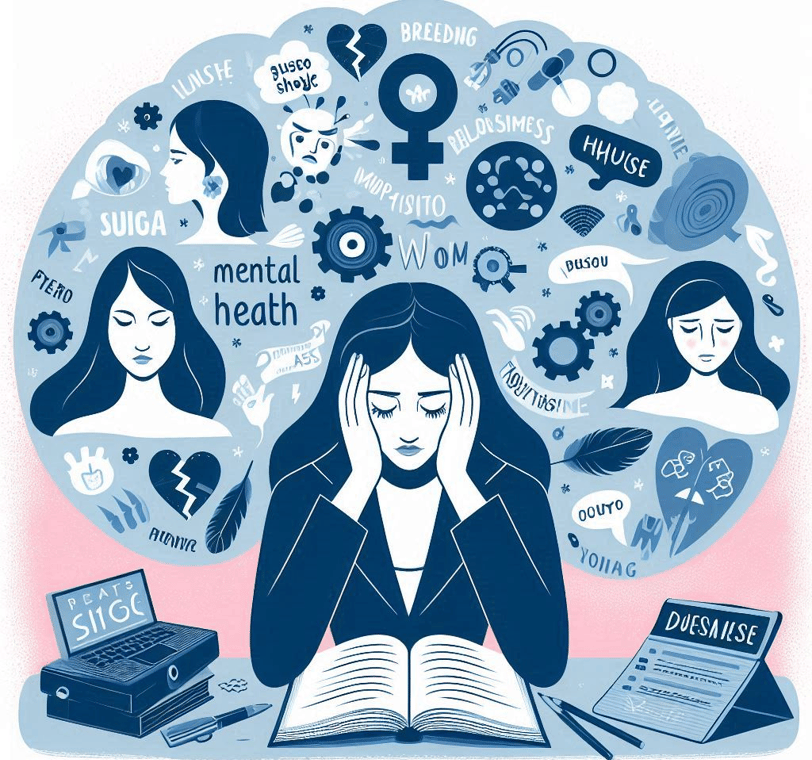Women’s Mental Health: Breaking the Stigma
Mental health is a crucial aspect of overall well-being, yet it remains stigmatized, especially for women. This blog post delves into the unique mental health challenges women face, from hormonal fluctuations to societal pressures, and highlights the impact of stigma. By promoting open conversations, education, and support systems, we can break the silence and create a more understanding and supportive environment. Discover practical tips for self-care, the role of digital tools, and the importance of advocacy in improving women’s mental health outcomes. Join us in breaking the stigma and supporting women’s mental health journeys.
9/7/20242 min read


Mental health is a vital component of overall well-being, yet it remains shrouded in stigma, particularly for women. Societal pressures, gender roles, and hormonal changes contribute to unique mental health challenges that women face. This blog post aims to break the stigma surrounding women’s mental health by exploring these challenges and advocating for open conversations and supportive environments.
Understanding the Unique Challenges
Women experience mental health issues at higher rates than men, often due to a combination of biological, social, and psychological factors. Hormonal fluctuations during puberty, menstruation, pregnancy, and menopause can exacerbate conditions like anxiety and depression. Additionally, societal expectations and gender roles often place women in caregiving positions, leading to increased stress and burnout.
Did You Know?
Hormonal Influence: Studies show that women are twice as likely to experience depression as men, partly due to hormonal changes.
Caregiving Stress: Women are more likely to be caregivers, which can increase their risk of mental health issues.
Impact of Stigma
Stigma surrounding mental health can prevent women from seeking the help they need. Fear of judgment, discrimination, and being labeled as “weak” or “unstable” can discourage women from discussing their mental health struggles. This silence can lead to worsening symptoms and a lack of support, further entrenching the stigma.
Fact Check:
Seeking Help: Only about 25% of individuals with mental health issues feel that others are understanding and supportive.
Workplace Stigma: Nearly 60% of employees have never spoken to anyone at work about their mental health.
Breaking the Stigma: Steps We Can Take
Open Conversations: Encouraging open and honest discussions about mental health can help normalize these experiences. Sharing personal stories and listening without judgment can create a supportive environment.
Education and Awareness: Educating ourselves and others about mental health can dispel myths and misconceptions. Understanding that mental health conditions are medical issues, not personal failings, is crucial.
Support Systems: Building strong support networks, including family, friends, and mental health professionals, can provide the necessary support for those struggling with mental health issues.
Advocacy: Advocating for mental health policies that ensure access to care and protect against discrimination is essential. Supporting organizations that work towards mental health awareness and resources can make a significant impact.
Self-Care and Mental Health
Self-care is a critical aspect of maintaining mental health, yet it is often stigmatized as selfish or indulgent. Women, in particular, may feel guilty for prioritizing their own needs. However, self-care is essential for managing stress and preventing burnout. Practices such as mindfulness, exercise, adequate sleep, and setting boundaries can significantly improve mental well-being.
Quick Tips for Self-Care:
Mindfulness: Practice mindfulness or meditation for at least 10 minutes a day.
Exercise: Engage in physical activity you enjoy, like dancing, walking, or yoga.
Sleep: Aim for 7-9 hours of quality sleep each night.
Boundaries: Learn to say no and set boundaries to protect your mental health.
The Role of Digital Tools
Digital tools, such as mental health apps and online therapy platforms, are making mental health support more accessible. These tools can provide resources, track mental health progress, and offer virtual therapy sessions, making it easier for women to seek help discreetly and conveniently.
Tech Talk:
Mental Health Apps: Apps like Headspace, Calm, and BetterHelp offer meditation, therapy, and mental health tracking.
Online Therapy: Platforms like Talkspace and BetterHelp provide access to licensed therapists from the comfort of your home.
Breaking the stigma surrounding women’s mental health is a collective effort that requires open conversations, education, support, and advocacy. By addressing the unique challenges women face and promoting a culture of understanding and acceptance, we can create a world where women feel empowered to seek the help they need. Let’s work together to break the silence and support each other in our mental health journeys.
